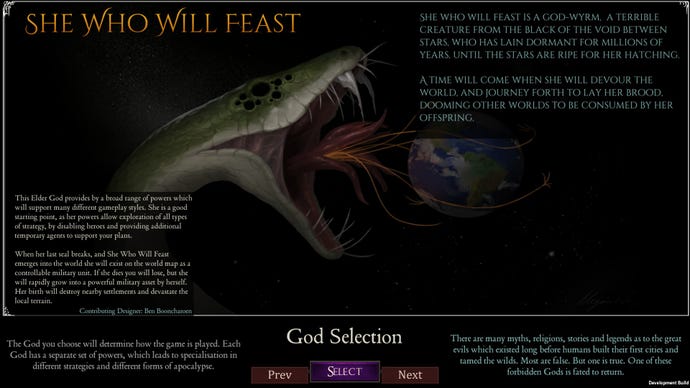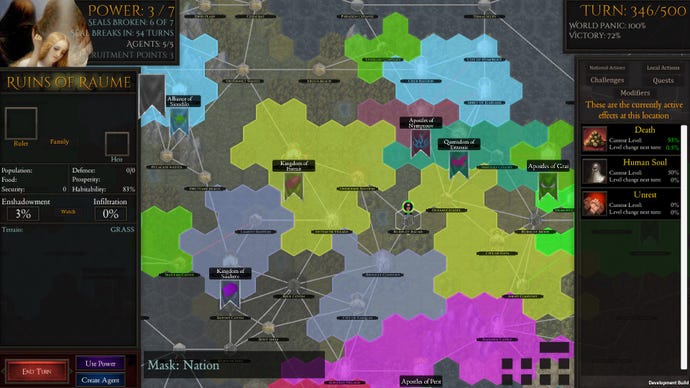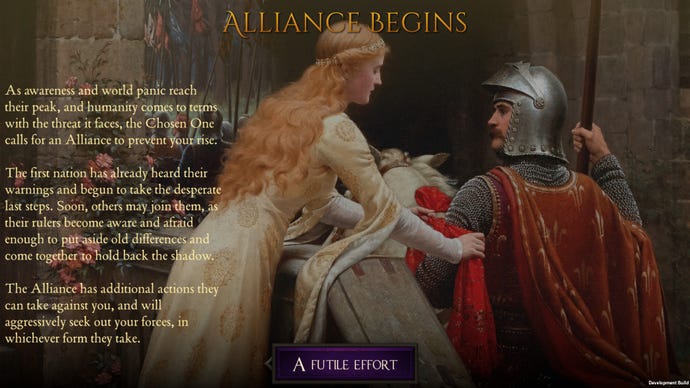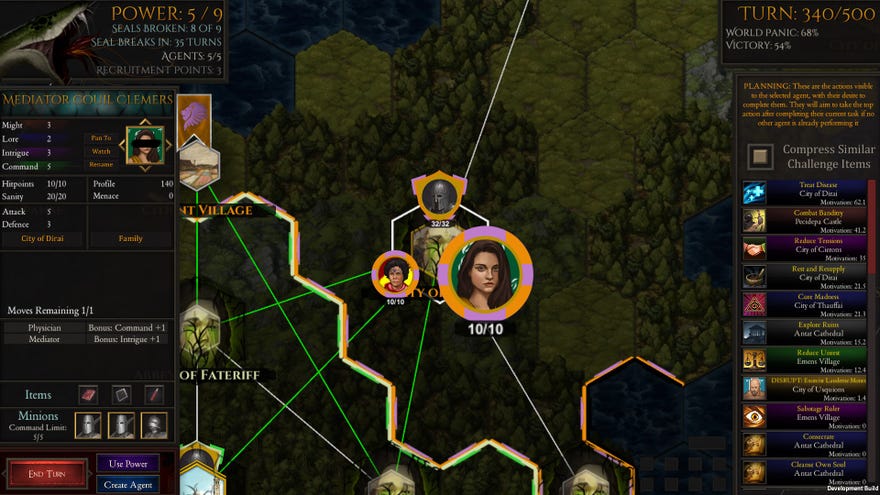The Rally Point: Shadows Of Forbidden Gods exhibits the power of evil chaos theory
Pedagogue of Wrong Gods
Gods. Those jerks. You know what the problem with god games is? They've got no subtlety. It's all open worship and overt power, conquering and seizing so you're only superficially different to a 4X or management game.
Shadows Of Forbidden Gods is different. It's all about building the power of your evil god under the radar until it's too late for anyone to defeat you. The more I've played it, the more I start to suspect that this concept will always suffer from being gamed by player who'll seek the most efficient paths. Any system of influencing and manipulating characters will necessarily be abstracted, and at some point subtlety becomes just another numerical value.
I suppose what I'm saying is that SOFG is more fun if you revel in scheming and causing chaos, and given the choice between effective and interesting, will always do the right thing.
The premise is actually pretty novel. You're an ancient, absolutely evil god preparing to return to the world, and can act almost exclusively through a handful of human agents. They must gain access to powerful people and corrupt or destroy them, removing any chance at resistance.
They can't do this directly though. It's not a case of approaching barons and warriors and throwing some dice to see if you can infect or mind control them. Instead, your agents will spread Shadow (corruption/evil, essentially) across the world, along with maddening curses and eldritch cults. People residing in sufficiently corrupted areas gradually lose their ability to fight or even notice anything's amiss. But the real challenge isn't corrupting the world. It's corrupting the world without drawing the attention of the Chosen One.
Every game has a Chosen One who is aware of your nature. That character will travel the world just like your agents, but instead of spying and stealing, they'll warn everyone.
Every game has a Chosen One who is aware of your nature and imminent return. That character will travel the world just like your agents, but instead of spying and stealing and profaning altars, they'll warn everyone, then build an alliance of kingdoms against you, and finally, if you really let it go down to the wire, fulfill the prophecy to find your evil party bus and play Ed Sheeran albums in it until you flee reality forever. The world is big enough, and influencing it slow enough, that you can't challenge them directly at first, and any time your agents spend meddling is time they're not opening more doors, so you're both playing a long game.
Although it is possible to eventually kill the Chosen One, by then they'll probably have brought other heroes on board, and convinced multiple rulers to ward their lands against evil. This is where it gets really fun, because making your numbers go up isn't your best tool. Your best tool is remembering that you're the Ultimate Evil who the Chosen One is meant to destroy, so you should be absolutely revelling in chaos and confusion. Every hero is present on the map and playing their own game, so why not give them side quests? The Chosen One might have convinced a brave doctor to root out and destroy your followers, but he'll be too busy picking posies if you spread a good plague across the southern lands. A great warrior is beyond reach of the Shadow? Have some agents inspire the orcs to build up their armies so the do gooder idiot will run off to fight them instead.

Distraction is key, and it gets even more direct if you really lean into it and play recklessly now and then because although the heroes can become aware of you, they've no idea who your actual agents are unless they tip their hand. Every agent has a "profile" and "menace" level, representing how noticeable they are, and how much of a threat they appear to be. Each is independent, so you can have your Courtier keep a low profile while your Heirophant goes full chaos, or even outright sacrifice one for the other. Better still, heroes and rulers can consider each other a threat, or be manipulated into friendship with your agents. I didn't appreciate this at all until I foolishly sacrificed my Trickster (whose unique abilities include framing people for your other agents' actions) in a kamikaze attack against the Chosen One to stop him from uniting with a kingdom I needed. She died, but two other NPCs were very fond of her. My other agents were able to drive their grief at her death into a full vendetta against his entire house. Within two turns, the Chosen One's crusade to save the world was being actively undermined at every turn by his own natural allies. You would not believe the cackling this game gets out of me.
It wasn't the smart play to attack him, but the result was too hilarious to regret, and it taught me that the real joy of Shadows Of Forbidden Gods is to play it like Skyward Collapse; not cautiously and carefully measuring every move, but causing as much mayhem as possible and seeing if you can ride the tsunami home. You still have to time it well, and misdirect wherever possible, but your agents are mere pawns. Killing one off is nothing - these mortal fools are all doomed anyway - as long as they don't take you down with them.

There's even one god with the power to declare an agent a heretic, sacrificing their life in exchange for convincing multiple heroes that you're no longer a threat, fully removing their awareness of you. You can essentially fake your own death just to frustrate your opponent. That same god, the Ophanim, is built on the delicious concept of building a false religion to capitalise on fear of the Shadow that you're also spreading. At any location you've infiltrated, the Ophanim can establish a religion that will grow more rapidly the more Shadow you expose the area to. If the followers' faith is high enough they lose all free will, and will blindly join your theocratic empire, waging crusades against whoever you like, even outright destroying cities to root out unbelievers.
That one is particularly messy and confusing, and frankly the AI isn't quite equipped to deal with it yet, but by the time I felt like that, I'd also ripped the biggest kingdom going into seven pieces with holy wars and dark empires, and used a holy power to turn the devastation into inspiration for yet more luckless followers. Another god is built around a book that drives readers mad, who only gains power if people are reading it. But making it accessible makes it possible for heroes to seize it, at which point you have to rob or kill them before they can take it to your altar and use it in a ritual against you.

One Chosen One established good relations with a king near my stomping ground, but fortunately there was widespread famine in the area (not my doing), causing unrest which my Courtier was able to whip up into a rebellion. The king was executed, undoing all that diplomacy, and my Trickster followed up by selling the hero a "health potion" that was actually poison. I cannot stress enough how even if you're playing a super surreptitious game, and even if the world is doing a fine job of wrecking itself with war and lovecraftian occultism without you, you ought to be sowing as much chaos as possible.
It's also a pleasantly chill time, despite the subject matter and the complexity. Much like Crusader Kings, the world is too big for you to keep track of everything, much less control it, and your most powerful plays are mostly those that grow beyond you and sustain or even spread themselves. You only have a handful of agents (a mere one at first), and each turn involves only a few straightforward decisions. The music deserves a mention too, as its simple soft strums of some friendly stringed instruments were a counter-intuitive, but inspired choice. It reminds me somewhat of Medieval Colon Total War in that respect.

I'm pushing the chaos and stories angle hard because, if I'm honest with myself, I can see Shadows struggling with balance even after it leaves early access (in an estimated two months). There's just way too much going on, too many variables and options and rippling consequences to ever pin everything down without sacrificing too much. It's also in dire need of a UI overhaul, as there's so much information buried away in awkward places I struggle to even describe. There are several overlays but even they are woefully inadequate, and render a few options far too fiddly to keep track of. Even something as simple as selecting a location is a case of repeatedly clicking on it to cycle through every character there first, which I'd have a fit about if this wasn't still in early access.
But there's something a bit special here, for those with an eye for an offbeat structure. The only game I can directly compare it to is Heretic Operative, but the joy of playing the outright baddies sets it apart even from that. Where AI War was about skirting around the AI's progression rules, and playing as pirates in Distant Worlds was more a form of parasitism, Shadows of Forbidden Gods is a strong effort to simulate something original and unusual, and it's already colourful and entertaining enough to be worth your time.


